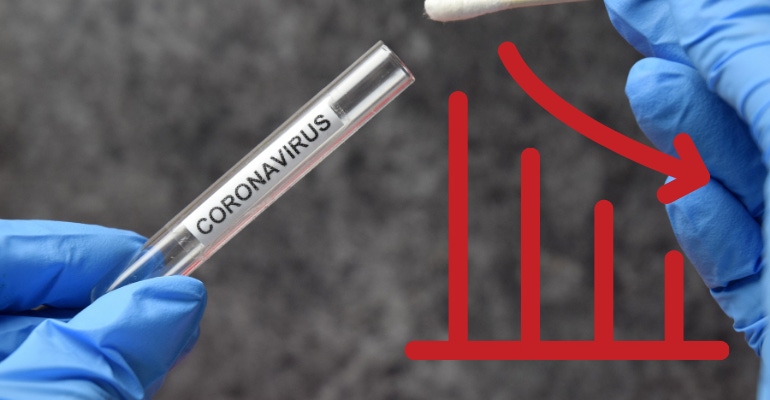June 7, 2021

Abbott's outlook for rapid COVID-19 testing has changed significantly as the company has seen a sudden drop in COVID-19 testing demand due to shifting in guidelines related to testing for people who are fully vaccinated.
In April, the company reported that total COVID-19 testing sales declined to $2.2 billion in the first quarter from $2.4 billion in the fourth quarter of last year, which contributed to a total sales miss of about $230 million (including a miss in the diagnostics segment of roughly $360 million) compared to analysts' forecasts. That said, CEO Robert Ford empahsized at the time that COVID-19 testing demand was still healthy, and that Abbott's BinaxNow COVID-19 test kit had just recently received emergency use authorization. The EUA enabled consumers to perform rapid, at-home, serial screening for COVID-19.
"We see this as a significant opportunity, and quite frankly, a trend that’s been happening overseas and is kind of now happening here in the U.S., which is this move, accelerated move, from, say, more hospital lab-based testing to more rapid testing outside of that environment where consumers and people can get their results at a much faster rate, and quite frankly with a little bit of less hassle, less process," Ford said during the first-quarter earnings call.
As he continued to tout the new offering, he emphasized ease-of-use and affordability as being keys to success in terms of COVID-19 surveillance and serial testing.
"It needs to be affordable. It’s difficult to do serial testing on [point-of-care] when you’ve got a cost of $100 plus and takes between two to three days to get that. So I think we’re in a great opportunity here to be able to capitalize on that," Ford said. "I think this is something that people are going to want to buy and have in their homes and stock up in their homes. Think of it as maybe your new element in your medicine cabinet. We’ve been seeing this shift happen towards the end of last year and definitely into this quarter here, this move towards rapid [testing]."
He also pointed out that Abbott's understanding of the U.S. retail channel through its nutrition and diabetes businesses gives the company an advantage for rolling out over-the-counter test kits for COVID-19.
"A key aspect of that is obviously scale," Ford said during the call. "We have to have scale to be able to meet the demand, and quite frankly, we’re probably the leaders here in terms of production. We’ve got an established capacity this quarter now that we can do about 150 million rapid tests per month across all of our different platforms, so we feel very good about that position."
But last week Abbott changed its tune a bit with an update to its financial outlook for the year due to "significantly lower recent and projected COVID-19 diagnostic testing demand."
The company said the downward trend has been driven by several factors, including COVID-19 case reductions in the United States and other major developed countries, accelerated rollout of COVID-19 vaccines globally, and, changes in the U.S. health authority guidance on testing for fully vaccinated individuals.
Abbott noted that it's positive that these trends signal an accelerated return to normalcy for many countries, but they have suddenly and fundamentally impacted market demand for COVID-19 testing, particularly for surveillance and screening with rapid testing.
As a result, Abbott now projects full-year 2021 diluted earnings per share (EPS) from continuing operations under generally accepted accounting principles of $2.75� to $2.95 and full-year adjusted diluted EPS from continuing operations of $4.30 to $4.50, reflecting strong, double-digit growth versus the prior year.
Marie Thibault, a medtech analyst at BTIG, said in a report that Abbott's underlying businesses remain strong, and that the benefits of an expanded diagnostics installed base will not disappear. Abbott reported about a 10% growth in its base business for the first quarter of 2021 compared to the first quarter of 2019, Thibault noted, with acceleration in April.
"Though the outlook was not formally reiterated, double-digit EPS growth in 2022 remains a potential target," she said in her report, which was issued June 2.
Thibault also pointed out that Abbott's upcoming product launches, specifically its Amulet minimally invasive left atrial appendage closure device, Navitar and Portico transcatheter aortic valve replacement systems, Aveir leadless pacemaker, and CardioMEMS remote heart failure monitoring solution, are expected to support high-single-digit growth in 2022.
It's also worth noting that Abbott should benefit from Medtronic's decision to pull the plug on HeartWare.
Abbott said it has the capacity and supply to effectively support the growing demand for mechanical circulatory support devices with its HeartMate 3 device.
"For years we have seen truly life-saving results in patients treated with mechanical circulatory support devices. Ensuring continued access to these devices is critical for patients," said Mike Pederson, senior vice president of Abbott's electrophysiology and heart failure business. "We are working to ensure that physicians have the support and training they need as they further adopt HeartMate 3 to improve outcomes for their advanced heart failure patients."
About the Author(s)
You May Also Like



.png?width=300&auto=webp&quality=80&disable=upscale)
